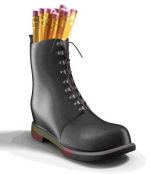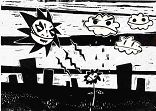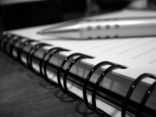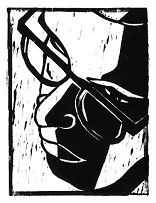|
Essay Writing C Download the course policies and syllabus.
"I am going to be rather hard-nosed and say that if you have to find devices to coax yourself to stay
focused on writing, perhaps you should not be writing what you're writing . . . It is work; art is work." |
JOHN MCPHEE, Pulitzer Prize winner and grandmaster of literary nonfiction, said about writing, "The first draft [is] an unreadable thing. And you would not want to show it to anybody because it's just full of entrails hanging out with loose ends . . . You belch it all out on paper. When you've got something on paper, you then have something to work with . . . and turn into a piece of writing." Writing is all about guts, gas, gross anatomy, and getting down to business. Writing isn't a check mark, a destination vacation, a graduation requirement. Rather, it's a practice, a process, an extreme sport. This course will take up McPhee's writer's heroic journey--from unreadable thing to piece of writing--by engaging what it means to be a good writer and reader, how to recognize and develop the skills and strategies to write, read, and analyze, and why good writing and reading are central to everything you do. Be prepared for a term of high-impact, low-stake, high-risk, creativity-freeing, genre-tripping, word-playing, workshop-intensive writing, reading, and thinking. This will be hard, but it will be fun. You will hate it, but you will grow to love it. We will trek, tromp, jump, crunch, sweat, and swear through academic, expository, persuasive, and creative writing challenges. We will set high goals and meet tough benchmarks. We will hone the tools and muscles you already have and push, stretch, and dream till you're one lean, mean writing machine. Are you ready? Let's do this.
Essential QuestionsWhat is good writing? What makes a good writer? More importantly, how do you develop a strong writing process? Specifically, what is academic writing, expository writing, creative writing? How might different forms and genres of writing overlap and connect?
Outcomes
Students will understand . . . |
"The world I create in writing compensates for what the real world does not give me."
Required Course Texts & Materials
• Essay Writing C Course Reader (available via the Robinson Center). |
|
Course Requirements
Writing Challenges (40%)
"Imagination is more important than knowledge."
"An idea that is not dangerous is unworthy of being called an idea at all."
"I always advise children who ask me for tips on being a writer to read as much as they possibly
can. Jane Austen gave a young friend the same advice, so I'm in good company there."
|
Requirements & GradingYour grade should not be the sole exigence or motivation for this class. It is the hope of the course that you walk away from Essay Writing with something more. Find some pleasure and some edification and some knowledge from this class (or any class really) and success is usually not far behind. With that in mind, your grade will be a reflection of engagement, effort, close reading, critical thinking, writing, revision, and participation. Writing Challenges/Short Papers (40%) The majority of the writing you will do for this class is in the form of short, critical, and well-conceived papers. Each week you will be given one or more "writing challenges," particular writing task to accomplish in 1 to 4 pages. Writing challenges focus on specific skills, forms, genres, and ideas to work out particular writing muscles and habits. From personal narrative to close reading to poetry to exposition to argument, these short papers will be graded on clarity, coherence, analysis, concision, and how well they satisfy the assignment. See the Writing Challenge/Short Paper prompt for more details. Final Portfolio (20%) The capstone of your writing boot camp will be your final portfolio, your honed and toned body of work. The final portfolio will include: your selected Writing Challenges, your Major Paper, and a cover letter that explains how the portfolio demonstrates the goals and outcomes for the course. The cover letter, in fact, is the final week's Writing Challenge. Your portfolio will be graded on completeness, organization, revision, and presentation. A portfolio that does not include all the above will be considered incomplete. Participation and Preparedness (40%) Preparedness and participation forms a large component of your final grade. It is essential that you prepare for class, attend class, and participate. Missing class may seriously compromise your ability to do well in this class. Again, negative participation will hurt your participation grade. Participation is determined by 1) your respectful presence in class, 2) your willingness to discuss, comment, and ask questions, 3) your preparation for class, which includes bringing required materials to class and doing all of the assigned reading for class, 4) your Process Journal, 5) your engagement in group work, workshopping, and in-class presentations, 6) your care and use of the class blog (bookmark the address, check and comment regularly, think of the blog as an extension of class): https://catalyst.uw.edu/gopost/board/changed/40404/ and 7) your interactions with me and other students. Finally, failure to turn in homework, incomplete assignments, or late papers will negatively impact your participation grade.
AssignmentsWriting Challenges/Short Papers (40%): The majority of the writing you will do for this class is in the form of short, critical, and well-conceived papers. Each week you will be given a "writing challenge," a particular writing task to accomplish in 1 to 4 pages. Writing challenges focus on specific skills, forms, genres, and ideas to work out particular writing muscles and habits. These short papers will be graded on clarity, coherence, analysis, concision, and how well they satisfy the assignment. Writing Challenges are due weekly, but you need only complete a minimum of 7; some challenges are required.
Writing Challenge #1: Personal Statement
Final Portfolio (20%):
The capstone of your writing boot camp will be your final portfolio.
The final portfolio will include: all of your Writing Challenges, a table of contents, three revised short papers,
and a cover letter that explains how the portfolio demonstrates the goals and outcomes for the course. The cover
letter, in fact, is the final week's Writing Challenge. Your portfolio will be graded on completeness, organization,
revision, and presentation. A portfolio that does not include all the above will be considered incomplete.
|
Late Assignments All assignments must be done completely and turned in on time. Lateness will subtract from your assignment's final grade and work must be turned in as soon as possible. Note that I will not comment on late work. However, you still need to complete late work for a complete portfolio. If you miss class on the due date of a paper, you must notify me and make arrangements to get the paper to me as soon as possible. Unless previously arranged, I do not accept assignments via email. Furthermore, all work must be seen and checked by my to be eligible for your final project! Remember that a paper has not been officially handed in until it is in my hands. Never turning anything in late is always the best policy.
|
|
"Suit the action to the word, the word to the action." |
AttendanceAttendance is required. If you are absent, you miss the explanation of an assignment, the discussion of a reading, the chance to play and participate, and overall, the class as a community of learning. Also, you are expected to be in class on time. Class will start immediately at the appointed time. In the first minutes of class I may make important announcements, establish the agenda for the class meeting, begin immediately with an important lesson, or field questions. If you come in after we start class, even by only a few minutes, you are late and we will mark you as such. Chronic or conspicuous attendance problems will negatively affect your overall participation grade for the class. If you know you are going to miss class, please let me know ahead of time (via email), if you can, and make any necessary arrangements. And when you do miss class, always find another student to get class notes and see me in order to make up missed work in a timely manner.
Learning (With) Technology
Unless you have an official accommodation, the use of technology in our classroom is a privilege, not a right.
Mobile devices like phones, media players, and cameras should be off and put away. Computers and tablets should
be used for note-taking, in-class work, and readings only. Print is generally preferred for course texts and
readings, but full-size e-versions are acceptable provided the student is able to readily highlight, annotate,
and index. Finally, be conscientious and respectful in the use of the course website and social media and post
no material from class to the internet or non-class sites without explicit permission from the instructor and
the class. Keep in mind these three rules: 1) Use the Right Tool for the situation and the task--keep it simple
and elegant, 2) Practice Best Practices--it must improve or enhance your learning, 3) Be a Good Neighbor--it cannot
distract or detract from others' learning. Inappropriate use and abuse of technology in class will result in
the taking away of technology privileges for the offending student and/or class as a whole.
|
"You can't wait for inspiration. You have to go after it with a club."
|
|
Response Paper Formatting 1) 1" margins top, bottom, left, and right on each page. 2) Single-spaced block header with your name, date, course, my name. 3) Appropriate title. 4) Standard Times Roman Font, 12 point only. 5) Number all pages except for the first page in the top right-hand corner. 6) Correct MLA citation and bibliographic format. Bibliography if necessary. 7) Stapled once at the top left corner.
|
Assignment FormatAll papers must be typed or produced on a word processor. All documents should be saved in Microsoft Word format; if you do not have access to Word, then save your documents in RTF or Rich Text Format. All papers must follow the manuscript format outlined by the assignment. Unless otherwise noted, all papers must use MLA citation and documentation conventions. All papers must be neatly printed (in black), stapled in the top, left-hand corner if necessary, and should not be three-hole punched. Papers that do not follow these format guidelines will not be accepted. They will be returned unread to you. Papers will be regarded as late until they are resubmitted in the proper format. Always make a backup copy of every paper you turn in, lest you be one of the unhappy people whose paper is eaten by the computer. You may even want to take the precaution of e-mailing your paper to yourself as an attachment at least a couple of times during the drafting process and certainly BEFORE you exit the document for the last time and leave the computer lab, your friend's computer, or even your own computer. This way, even if you lose your disc or your paper gets mysteriously erased, you still have a copy in your e-mail files.
Evaluation RubricOver the course of the semester, your assignments will receive feedback and comments that will identify what you are doing well and what still needs improvement. Your grades assess your fulfillment of the assignment, the quality of work, detail, analysis, and argumentation, overall effort, and finally, style, polish, and risk taking. Consider the following evaluation rubric as signposts or a kind of legend to your progress and evaluation:
• Outstanding (A/A+): Offers a very highly proficient, even memorable demonstration
of the trait(s) associated with the course or assignment goal(s), including some
appropriate risk-taking and/or creativity. |
Contact Ed
Office: Download the course policies and syllabus.
|
|
|
Academic DishonestyPlagiarism, or academic dishonesty, is presenting someone else's ideas or writing as your own. In your writing for this class, you are encouraged to refer to other people's thoughts and writing -- as long as you cite them. Many students do not have a clear understanding of what constitutes plagiarism, so feel free to ask questions about these matters at any time. Plagiarism includes:
• a student failing to cite sources of ideas
If you have any doubt about how to cite or acknowledge another's writing, please talk
to me. It is always better to be safe than sorry. As a matter of policy, any student
found to have plagiarized any piece of writing in this class will be immediately reported
to the College of Arts and Sciences for review. For further information, please refer
to UW's Student Conduct Code at
http://www.washington.edu/students/handbook/conduct.html.
Play it smart, don't plagiarize!
|
"I believe more in the scissors than I do in the pencil."
|
|
|
Information SheetsThe following are handouts, informational sheets, and readings that will be assigned or used over the course of the term. Each student will recieve a copy of each as a handout in class during the appropriate week. If you miss a sheet, feel free to print out a new copy. Ed's Top Ten List of "Ways to Survive University" Quoting, Paraphrasing, and Summarizing MLA Citation and Bibliographic Format Sports Illustrated Introductions
ReadingsAll of the short readings for class are available via the Course Reader (provided by the Robinson Center). Consult the course syllabus for the week each reading will be covered in class. The following is a full bibliographical list of the class readings: Alexie, Sherman. "The Joys of Reading and Writing: Superman and Me." Eds. McQuade, Donald and Robert Atwan. The Writer's Presence. Boston: Bedford/St. martin, 2003. 61-64. Bartholomae, David. "Inventing the University." Ed. Rolf Nargaard. Composing Knowledge. Boston: Bedford/St. Martin's, 2007. 208-213. Berkes, Howard. "The 'Unreadable' Thing: John McPhee on the Craft of Writing." SEJ Publications. The Society of Environmental Journalists. 15 Nov. 2006. 11 May 2015. http://www.sej.org/publications/journalismmedia/the-unreadable-thing-john-mcphee-on-the-craft-of-writing. Bradbury, Ray. "2026: There Will Come Soft Rains." The Martian Chronicles. New York: Bantam Books, 1950. 166-172. Brooks, Gwendolyn. "We Real Cool." Poetry Foundation. 11 May 2015. http://www.poetryfoundation.org/poetrymagazine/poem/17315. Bukowski, Charles. "So You Want to Be a Writer?" Poets.org. 10 May 2015. http://www.poets.org/poetsorg/poem/so-you-want-be-writer. Douglass, Frederick. "Learning to Read and Write." Eds. Comley, Hamilton, Klaus, Scholes, and Sommers. Fields of Reading: Motives for Writing. Boston: Bedford/St. Martin, 2001. 71-75. Freire, Paulo. "The 'Banking Concept' of Education." Ways of Reading. Eds. Bartholomew and Petrosky. Boston: Bedford, 1993. 206-219. Hughes, Langston. "Theme for English B." Eds. Comley, Hamilton, Klaus, Scholes, and Sommers. Fields of Reading: Motives for Writing. Boston: Bedford/St. Martin, 2001. 108-109. Jackson, Shirley. "The Lottery." 23 Jan. 2005. 10 May 2015. https://sites.middlebury.edu/individualandthesociety/files/2010/09/jackson_lottery.pdf. King, Stephen. "Toolbox." On Writing: A Memoir of the Craft. New York: Scribner, 2000. 111-137. Lamott, Anne. "Getting Started." Bird by Bird: Some Instructions on Writing and Life. New York: Anchor Books, 1994. 3-15. Lamott, Anne. "Short Assignments." Bird by Bird: Some Instructions on Writing and Life. New York: Anchor Books, 1994. 16-20. Lamott, Anne. "Shitty First Drafts." Bird by Bird: Some Instructions on Writing and Life. New York: Anchor Books, 1994. 21-27. Lamott, Anne. "Perfectionism." Bird by Bird: Some Instructions on Writing and Life. New York: Anchor Books, 1994. 28-32. Le Guin, Ursula K. "Why Are Americans Afraid of Dragons?" The Language of the Night. New York: Perigee, 1979. 39-45. Liu, Ken. "The Paper Menagerie." io9. 8 Nov. 2012. 19 Jan. 2015. http://io9.com/5958919/read-ken-lius-amazing-story-that-swept-the-hugo-nebula-and-world-fantasy-awards. Lopez-Alt, J. Kenji. "The Food Lab: The Science of the Best Chocolate Chip Cookies." Serious Eats. 19 Dec. 2013. 10 May 2015. http://sweets.seriouseats.com/2013/12/the-food-lab-the-best-chocolate-chip-cookies.html McGonigal, Jane. "Reality is Broken." Reality is Broken: Why Games Make Us Better and How They Can Change the World. New York: Penguin, 2011. 1-15. McPhee, John. A Sense of Where You Are. New York: Farrar, Straus and Giroux, 1999. Olmert, Michael. "Dibs." Milton's Teeth and Ovid's Umbrella: Curiouser and Curiouser Adventures in History. New York: Touchstone, 1996. 245-250. Orwell, George. "Politics and the English Language." The Collected Essays, Journalism, and Letters of George Orwell. Ed. Sonia Orwell and Ian Angos. New York: Harcourt, Brace, and Javanovich, 1968. 127-140. Ruhlman, Michael. "Brown Sauce." The Making of the Chef. New York: Holt, 2009. 55-64. Somerville, Siobhan. "Queer." Keywords for American Cultural Studies. Eds. Bruce Burgett and Glenn Hendler. New York: NYU Press, 2007. 187-191. Tan, Amy. "Mother Tongue." Eds. Comley, Hamilton, Klaus, Scholes, and Sommers. Fields of Reading: Motives for Writing. Boston: Bedford/St. Martin, 2001. 77-82. Wells, Pete. "As Not Seen on TV." New York Times. 13 Nov. 2012. 11 May 2015. http://www.nytimes.com/2012/11/14/dining/reviews/restaurant-review-guys-american-kitchen-bar-in-times-square.html.
Williams, William Carlos. "This is Just to Say." 11 May 2015.
http://www.poetryfoundation.org/poem/245576.
|
|
|
|
© 2015 Edmond Chang. All original material. All rights reserved. Email the webmaster of this site. These pages are best viewed with Mozilla Firefox or Internet Explorer. Open your browser to the largest viewable area. These pages are hosted by ED(MOND)CHANG(ED)AGOGY, the academic, professional, and creative website of Edmond Y. Chang. |
|









